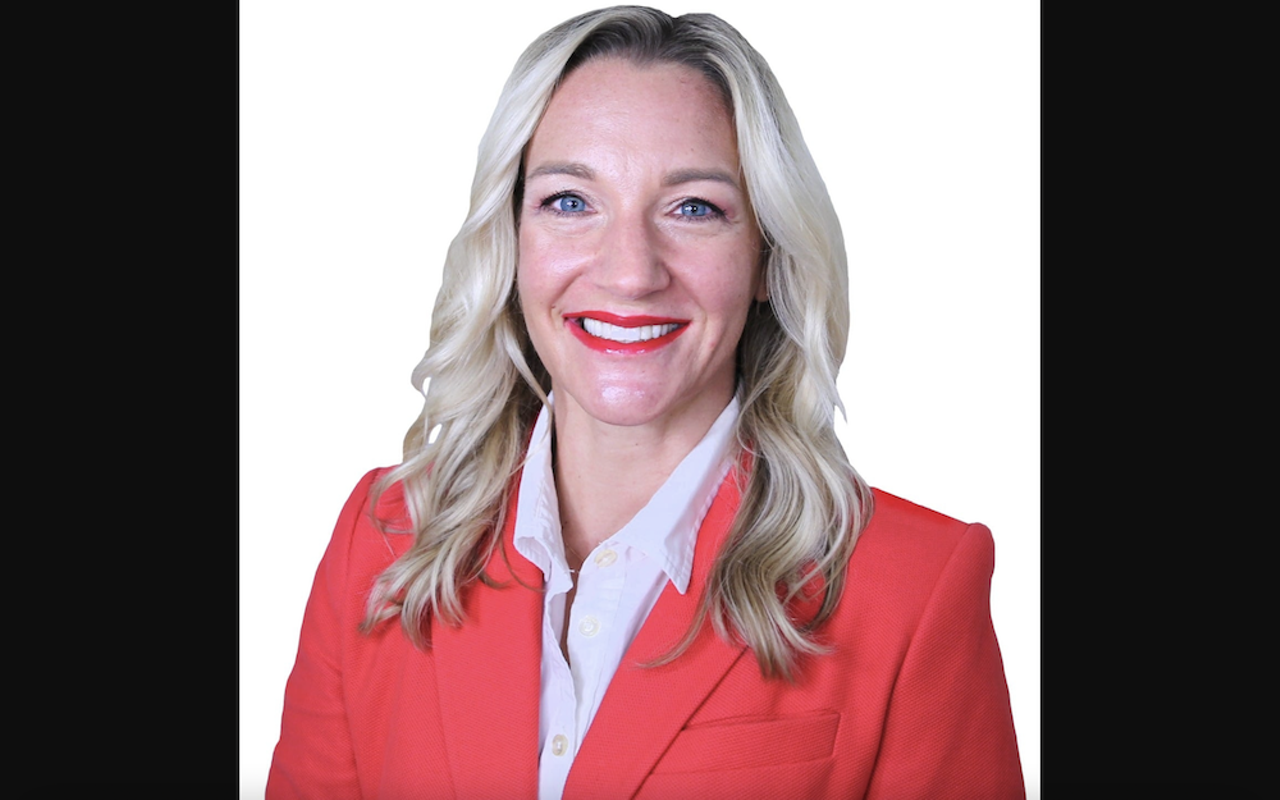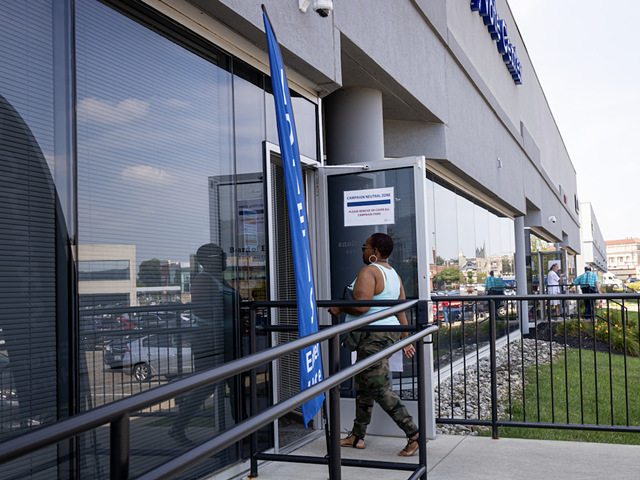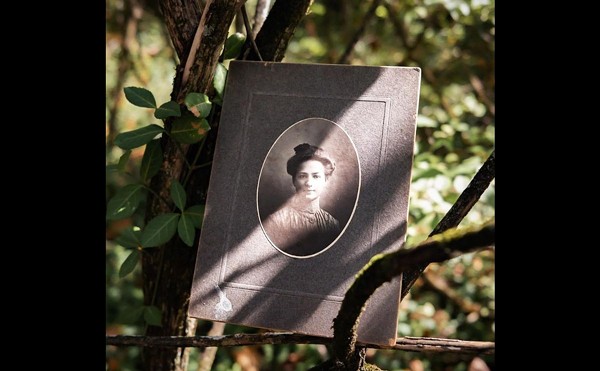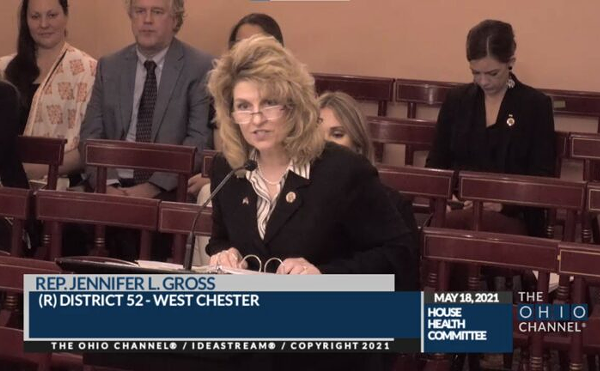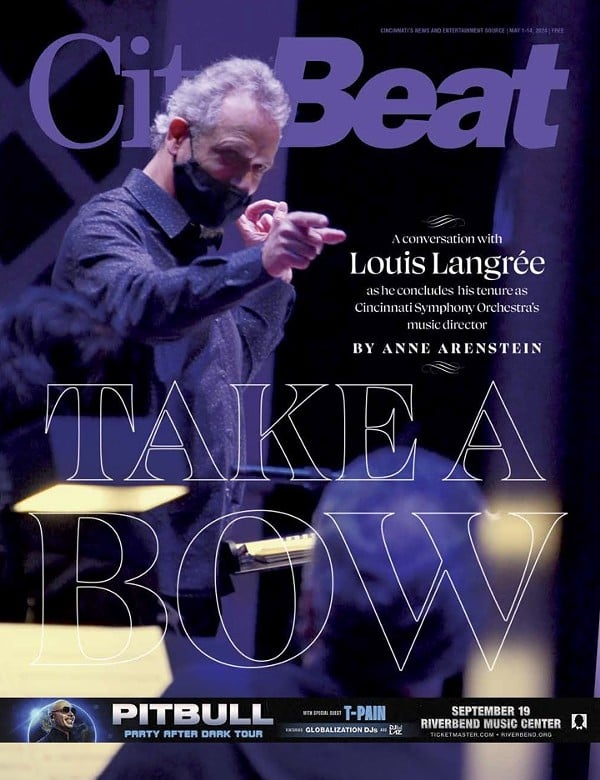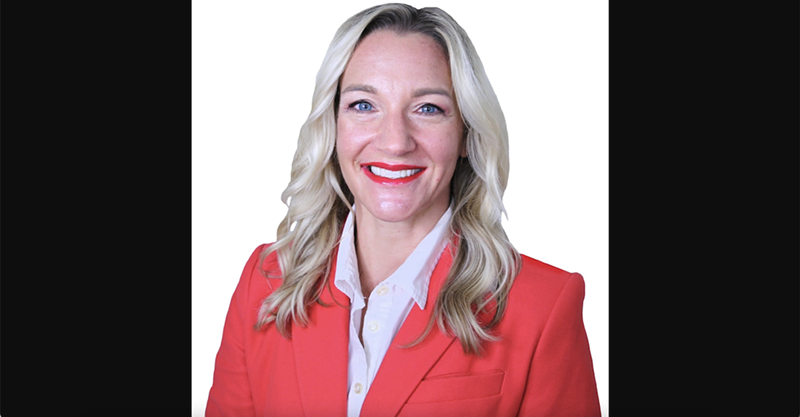
This story was featured in the Aug. 9 print edition of CityBeat.
Rachel Zipperian is preparing to send her two daughters back to school this fall, one to her junior year at Butler Tech, the other to her first year at Ohio University.
“I’m on my way to a concert right now,” she says while on the phone with CityBeat. “So we’re still having fun. She moves out on August 24, so me and her went on a big trip to Europe. We’ve been getting in some good quality time.”
Zipperian is enjoying summer while she can, because she knows there’s a fight ahead as Lakota Local School District parents return their kids to school and refocus their attention on the school board.
“We still have people that are out collecting signatures,” Zipperian says. “The hardest thing is that not a lot of people are aware of what’s happening.”
The signatures are to remove Lakota School Board member Darbi Boddy, who has made more headlines for her behavior on the board in the past two years than all other members of the board have combined, much of it focused on accusations involving critical race theory and the district’s attempts at diversity, equity and inclusion.
And Zipperian, like other parents and community members in the district, wants her gone.
A timeline of tumult
Boddy was first elected to the school board in November 2021, after running a campaign that railed against critical race theory (CRT), a lens through which scholars explain how racial bias is inherent in many parts of western society, especially in its legal and social institutions, as well as diversity programs and LGBTQ+ student protections in schools. Boddy’s campaign included a rally at a gun range, titled “Take Back Lakota School Board.”
That should have given parents and other board members a sense of what dealing with her would be like — but even so, Boddy managed to create a whirlwind of controversy:
- April 2022: Boddy made national headlines for accidentally posting a link to a porn website on her official Facebook page while speaking out against sex education and CRT. In the now-edited post, she apparently tried to include a link to a website that provides age-appropriate sex education for teens, but made a typo that sent clickers to a porn site instead. Soon after, the board voted unanimously, with Boddy as the lone “No” vote, to censure her. The censure included a motion to ask Boddy to voluntarily resign from the board, but she refused, storming out of the meeting.
- May 2022: The Lakota School District issued an order of trespassing to Boddy, alleging she’d repeatedly entered school buildings without following required procedures. Zipperian told CityBeat Boddy has tried to take photos of students when she suspects wrongdoing in action. “She happened to take a picture of a student while she was in there who was one of my former Girl Scouts, and this girl was very upset,” Zipperian says. “Her mom reached out to me and I was like, ‘This is enough.’”
- August and September 2022: Months later, during the start of the 2022-2023 school year, Boddy began zeroing in on Lakota Superintendent Matt Miller. Boddy claimed he was personally promoting CRT at Lakota Schools and that he engaged in inappropriate sexual conduct. Complaints from Boddy and community members led to an investigation from the Butler County Sheriff’s department, which found no probable cause for criminal charges against Miller, according to the board. The board conducted its own investigation, which also came up with nothing, but Boddy reportedly pressed the allegations further during school board meetings. Miller ultimately resigned as superintendent, directly blaming Boddy for creating a hostile working environment and alleging she’d promoted threats of violence against him and his family.
“I remain frustrated that the board as a whole did not protect me and my family from Ms. Boddy and her harassment, which has continued to this day,” Miller wrote in his resignation letter to the board on Jan. 20, 2023. “She has outright lied about me in public meetings, executive sessions and in official interactions with citizens. The efforts to which she and others went to achieve my resignation have terrified me and my family. Multiple death threats were made against me as a result of her campaign, and I have good reason to believe that Ms. Boddy was behind an attempt by one of her cohorts to gain access inside my home.”
- February 2023: Boddy garnered attention for arguing against suicide prevention in schools, comparing mental health groups to Nazis. "The encroachment into parenting is pure evil and we need to put it to an end. It is comparable to the Nazi handbook and a tactic of the communists is absolutely evil," Boddy said during a board meeting.
- May 2023: Boddy proposed a motion that would restrict trans students' use of their preferred bathroom and bar trans women from participating on women's sports teams. Boddy has repeatedly tried to push forward the discussion in board meetings since.
- June 2023: While students and staff were out for the summer, Boddy’s confrontations with other board members began heating up. In a June 22 video Boddy posted to Facebook, she confronts fellow board member Isaac Adi for allegedly telling Boddy her “brain is empty.” While following Adi with her phone in hand, Adi can be seen pushing the phone away, prompting Boddy to tell Adi, “You just assaulted me.” Boddy filed an assault report with Butler County Sheriff’s Office, who ultimately determined the incident was not an assault, closing the investigation.
“Blood libel” controversy
Following the U.S. Supreme Court’s decision on affirmative action on June 29, Boddy again made headlines, this time for using an anti-Semitic phrase to describe diversity programs.
“No more collective judgment, no more ancestral judgments, no more blood benefits, no more blood libels … that Americans are judged as individuals not in or by aggregate,” Boddy wrote on Facebook before later editing the post to swap “libels” for “liabilities.”
Rabbi Ari (Ballaban) Jun, director of the Jewish Community Relations Council for the Jewish Federation of Cincinnati, tells CityBeat he submitted a letter to the board over Boddy’s use of the word, saying:
“The term ‘blood libel’ has a particular historic meaning, and it is specifically associated with a millennia-old form of anti-Jewish persecution. According to the American Jewish Committee’s Translate Hate Glossary of terms/phrases linked to antisemitism: ‘As one of the longest-standing forms of antisemitism, blood libels have led to horrific violence, destruction, persecution, and massacres of Jewish people and communities — before, during, and beyond the Nazi propaganda that used it to demonize Jews. Despite its utter falsehood and its disavowal by Jews, the Roman Catholic Church, and other nonreligious authorities, blood libel remains an influential myth in the 21st century.’ Universal experience and Jewish tradition teach us that words have consequences.”
Boddy doubled down on her use of the phrase, saying critics needed to “get a grip,” and that the term is appropriate when criticizing CRT.
“The critical race theory ideology that white people are oppressors is taught in our government institutions, in our schools across the country, and the corporations. i.e. blood libels,” she wrote on Facebook.
During a July 17 board meeting in which Rabbi Jun’s letter was read aloud by Lakota School Board President Lynda O’Connor, Boddy continued to defend herself, saying, “You cannot take a word and claim it as your own. ‘Blood libel’ in this case is dealing with America, obviously, not Israel.”
Rabbi Jun described his first and only in-person interaction with Boddy after the meeting in his blog, saying Boddy literally turned her back on his request for a meeting:
“I shook her hand and introduced myself as ‘Ari Jun.’
‘Oh, you’re the rabbi.’ She continued, ‘I really can’t talk.’
‘I understand, and it’s nice to meet you. Like I’ve said before, I’d really love to meet in person sometime to build trust, share with each other, and learn from one another.’
‘I don’t think there’s any point, we just disagree about what the words mean.’
‘Still, I think it would be good for us to come together.’
And that’s when she turned her back, walked away, and left the auditorium.”
Boddy tells CityBeat she believes the Jewish Federation of Cincinnati took her words out of context.
“There was never a time I didn't understand the phrase; it was just taken out of context. Blood libel is pretty self-explanatory. We all know what bloodlines are, and anyone can look up the definition of libel,” Boddy says. “With regard to those who attempted to ignore my statement and take that use of words out of context (as was the case with the Jewish Federation of Cincinnati) … ultimately, it sounded like they understood that I was speaking of the blood libel against white people perpetrated by the political left in America.”
An antipathy for diversity
At the heart of Boddy’s nearly two years of clashes with other board members is her belief that the Lakota Schools, and the entire public education system, is using CRT to teach white students they are oppressive racists, and that Diversity Equity and Inclusion (DEI) programs reinforce this in schools.
“The originators, organizers and purveyors of these programs aren't hiding their agendas,” Boddy tells CityBeat. “They believe the U.S. has advantages and disadvantages by race, and that it has been that way for the entire history of the country, and because the problem is race-based the solutions must be race-based. Does Lakota have DEI? Yes.”
Lakota doesn’t technically have a DEI program, or at least not as Boddy has described. Instead, the Lakota Office of Diversity and Inclusion (LODI) was created in 2018. According to the district’s website, LODI’s mission is to “promote a welcoming and equitable experience and a culture that values diversity in all its forms through inclusive dialogue, interpersonal experiences, intercultural appreciation, and targeted professional development.”
Lakota School District spokesperson Betsy Fuller tells CityBeat that Boddy’s DEI contentions are wholly untrue.
“Lakota follows the learning standards that are set by the Ohio Department of Education. Our teachers are experts in their field and center their instruction around these standards. The district does not have racist policies nor does our curriculum promote racism. To date, we have not received any tangible evidence that would support this accusation,” Fuller says. “At Lakota, we are proud of the diverse makeup of our student community, and we celebrate these differences on a daily basis.”
None of Boddy’s motions to eliminate DEI or CRT in the schools have been embraced by the board, but that doesn’t mean her relentless efforts have not caused change.
Alex Argo is a parent of three Lakota students. He says Boddy has driven out talent from the district while looking for something that just isn’t there.
“Even if most of her motions on the board die, what we kind of see is this trickle of people leaving the school district,” Argo tells CityBeat. “Our superintendent, when he resigned, said that it was because of Mrs. Boddy. We also lost our prior treasurer, our head of curriculum has left. There was a teacher who quit because (Boddy) came into her classroom and was asking all sorts of questions.”
There’s been another notable administrative departure, but it’s unclear if Boddy played any role in their decision. Elgin Card, the former senior director of LODI, announced this year he had accepted the superintendent position at Princeton Schools, starting in August.
But before Card left Lakota, he proposed the board do away with its traditional diversity committee of five board members, administrators and the superintendent, swapping it out for the Lakota Community Diversity Council.
O’Connor tells CityBeat the new committee will reflect the district’s view that diversity means more than just race and gender.
“Diversity is about barriers to kids, and those barriers to learning,” O’Connor says.
The new committee will be led by O’Connor and fellow board member Kelley Casper, who tells CityBeat diversity encompasses students of varying learning levels and socioeconomic backgrounds, too.
“It means special ed, it means gifted, it means socio-economic, it means our Latino population, it encompasses all of that. It’s not just race, it’s more than that,” Casper says.
During a July 5 board meeting, O’Connor laid out other groups included in the committee body.
“Areas that were considered for representation on council include various faith groups including the Sikh, Islamic, Christian and Jewish faiths. Other community sectors, Hispanic, African American, LGBTQ, special needs, gifted, senior citizens, elementary and secondary parents, military, business, socioeconomic levels, ESL students, recent graduates, law enforcement and diversity in the political spectrum on the committee as well,” O’Connor said.
O’Connor tells CityBeat an unexpected example of diversity that this new committee will aim to serve includes military families.
“The uprooting of kids, you’re moving from base to base, it’s your family that’s also a part of that service,” she says. “These kids are moving and it’s hard to uproot and go to a new place and make those transitions. Our kids already have transitions, even if you live in Lakota your whole life. You’re transitioning from grade level buildings, but these kids can be moving multiple times throughout their school career. What does that look like for those kids? Do we have a way for those families to connect and integrate, not just their students, but also our parents? So that they’re comfortable and welcomed into the schools and making sure those kids are keeping up?”
Two board members, O’Connor and Casper, and 20 community members selected by Card will make up the committee, leaving Boddy no path to participation. Community members were asked to sign an agreement that their participation last at least one year and that they commit to keeping conversations respectful. O’Connor told CityBeat their input will be valuable, but they’ll have no voting power.
“This will be an advisory group to the board, not a decision-making body,” O’Connor says. “I am really looking forward to an open, honest dialogue about the needs of our kids and how we best address those as a school district and as a community.”
The first meeting of the new committee will be Aug. 9, according to O’Connor.
Adi, who originally campaigned alongside Boddy under the local Republicans' endorsement, spoke glowingly to CityBeat about the new diversity committee.
“That’s my baby, that’s my baby. I’m one of those that created that. I supported it from the beginning and voted for it and I’m proud that we have that,” Adi says.
Like Boddy, Adi ran a campaign that stood against CRT, but he's yet to find any proof of a curriculum that matches Boddy's description of CRT at Lakota Schools.
“Some board members started to create lies, saying some things that are not there,” Adi says. “But the question is, where is it? Show me. Give us evidence. No school is perfect. There could be one or two teachers out there that might be doing things that aren’t right, but I have not found any yet. That doesn’t mean it’s not there, I don’t know, but what I don’t want to do is lie over something when I don’t have proof.”
In addition to the two board members, two staff facilitators and the 20 community members, Capster says Lakota’s new superintendent will sit on the committee. Boddy voted against the board’s recommendation to hire Dayton Public Schools superintendent Elizabeth Lolli for the job.
Once again, she brings up critical race theory as the reason.
“My no vote on this candidate reflected my strong belief that the position not be filled by someone who, I understand, sees the United States as systemically racist, and believes in the philosophy of critical race theory, and the programs that so many parents have been fighting,” Boddy says.
Board member Julie Shaffer tells CityBeat there’s no truth to Boddy’s allegations of racism in the district. She’s looking forward to a restored focus on the board’s priorities.
“As the only board member who currently has a student in Lakota, I can say that the accusations we hear from the board table are not what I am seeing within our schools,” Shaffer says. “I look forward to working with our new leadership team and focusing on student achievement and preparing students for a productive next step after graduation.”
Casper is also ready for the winds of change Lolli may bring in her new role.
“I’m looking forward to the new school year and I’m confident that Dr. Lolli will bring strong leadership that will ensure that the focus of the board remains on what really matters — every student in Lakota,” Casper says.
The signature campaign
While Boddy will no longer be able to rail against non-existent cases of CRT on the board’s diversity committee, Zipperian and Argo are still pushing ahead with an effort to remove Boddy from the school board.
“We always knew it was a long shot, but it was something that was better than doing nothing,” Zipperian says.
According to Zipperian, many in the community jumped at the chance to kickstart the campaign to remove Boddy even before her term ends in 2025.
“We needed to raise money for a retainer for a lawyer, and we opened that up, and within 24 hours we got all the money we needed,” she says. After making their formal complaint, the group had to get 7,000 signatures, which they started working on in early July of 2022. “After the summer came, I would go every week to the West Chester concerts and have a sign and people would sign the petition. We just started having spots at the library.”
So far, the petition campaign’s website says they have more than 4,000 signatures, more than 60% of what’s needed to advance to the next step, which is a formal legal process before a judge in the Butler County Court of Common Pleas.
With the start of the new school year, Zipperian is focused on getting the 3,000 signatures needed to complete the petition – all of which must come from Lakota voters. She told CityBeat she plans to collect signatures near voting locations on Aug. 8, the day Ohioans will vote on Issue 1. She says she’s hoping to reach new pockets of the Lakota community.
“I think if we can get a few groups who are engaged, that are just new areas, new groups, new audiences,” she said. “If we can get a couple really good collection drives, I don’t think we’re that far.”
As for Boddy, she tells CityBeat she’s not worried about the removal petition. She says it’s just “what the political left does.”
“It's a misinformation and smear campaign, and if they ever try to advance it will be proven to be just that,” she says.
Subscribe to CityBeat newsletters.
Follow us: Apple News | Google News | NewsBreak | Reddit | Instagram | Facebook | Twitter | Or sign up for our RSS Feed

